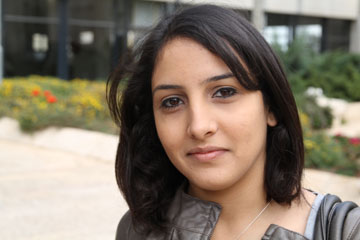Amal Odeh -- "I am a question mark"
By J.David

JERUSALEM -- "I am a question mark," Amal Odeh announces to a few of her Arab friends as she sits in an open courtyard on the Mt. Scopus campus of Hebrew University. Her peers laugh as they puff on cigarettes, shrug and continue their leisurely small talk passing time between classes. But Odeh is serious.
Odeh’s identity conflict colors every aspect of her existence; from her family life and educational choices to her career aspirations. The 21-year-old journalism student at the prestigious Israeli institution, founded by the likes of Albert Einstein and Sigmund Freud, is from Nazareth and wants to work for an Arabic news outlet. However, in order to learn from the best, she must first navigate through the conflicting messages of who she is.
"I am Palestinian even though we have no country. We have no home," Odeh's voice softens, her head drops and she looks to the ground. The word "home" carries a greater meaning to her than it does to the average student. "To this day, we have to fight to keep what little we do have."
But Odeh is talking about a different fight than that waged less than eight years ago when a Arab suicide bomber, dressed as a construction worker, blew himself up in the crowded Mt. Scopus cafeteria killing nine students and injuring 85 others.
Odeh’s fight is about preparing herself for her future in journalism. After graduation, the third-year student wants to work as a journalist in the Israeli media providing an Arab point of view written in Hebrew.
"I must learn in Hebrew, write in Hebrew, and talk in Hebrew. And if I want to express my feelings, I can't in my mother language,” Odeh describes one of the difficulties she faces attending a Hebrew university. “But one day I want to write in my language and have the freedom to talk without limits."
Later, Odeh and her friends will head to the campus quad to protest the Israeli occupation of the West Bank. Aware of their limitations, they demonstrate silently. But for Odeh and her friends, the expectation of silence extends beyond the quad and into the classroom for various different reasons.
"In a class of 100 students, you'll find only one or two Arabs, and never more than five," Odeh remarks. "As one of those five Arabs, I feel like I should be quiet and only listen."
This silence doesn't serve her well, she understands, as it keeps her identity a mystery to her Israeli classmates, But she also understands that knowing when to speak is just as important as knowing what to say.
"If a teacher or Jewish student says something you think is wrong, you can't disagree," Odeh laments. "You could be arrested for disagreeing and jeopardize your future."
Odeh lingers on the word “future” remembering the sacrifice by so many family members to secure an opportunity for her future.
In 1948, Israeli soldiers moved into the neighborhood where Odeh’s grandparents lived. Fearful of their enemy, many of the friends and neighbors of Odeh’s grandparents left everything behind and walked to Lebanon, Syria or Gaza. Some families, like Odeh’s grandparents, refused to leave and, after town officials agreed to give control of Nazareth to Israeli forces, were issued Israeli ID cards and nationality, a right that allows Odeh to attend Hebrew University today.
However, the benefits of the Israeli ID cards came with a price. Restrictions on travel to see relatives in the West Bank and Gaza have created walls of separation between family and friends. And although Nazareth is the largest Arab city in Israel, Odeh and her parents still feel like foreigners in their own home.
"It's hard to live like this. Like you don't belong," admits Odeh. "The basic things that humans have--a home, a life-- were taken away from my family."
Odeh still wrestles with the contradiction of her family staying in their home and receiving Israeli IDs yet, with the exodus of many of extended family and friends, experiencing the loss of belonging.
"So, I am Israeli now," she says with a matter-of-fact nod. "But," she pauses, "I'm not really that either."
Odeh arrives at her concession as the last remaining students make their way to class. Her friends, still deep in chatter, remain oblivious to the scores of Jewish students who've passed them in the courtyard without acknowledgment.
"It is an absolute dream that one day we will have our own place," Odeh says. "I really don't think it's a possibility, but maybe we can one day live together in a quiet society."
